This year’s Black History Month is taking place in the context of a brutal, genocidal campaign by Israel to repress the West Bank by murdering and arbitrarily arresting Palestinians and laying siege to, bombing, and invading the Gaza Strip. This genocide of Palestinians in Gaza has claimed the lives of up to 30,000 people, about half of them children, and 1.9 million of Gaza’s population of 2.2 million has been displaced. This Black History Month also occurs in the context of a global movement that has risen to fight for the Palestinian people, either through fighting for a ceasefire or fighting for an end to the Zionist occupation.
This global movement is facing harsh repression through the state’s targeting of movement leaders and attacking protesters. It is one of the latest examples of how fighting oppression can unite the international working class, allowing it to recognize itself as one multiethnic, multiracial, and international unit. This better positions the working class, that is, the revolutionary subject of socialism, to confront capitalism.
Today’s movement for Palestine is not, however, the first time this has happened; this has been going on for decades. In particular, the tradition of solidarity between Black and Palestinian liberation struggles has grown and evolved over the decades.
One of the reasons for this recurring expression of solidarity comes from the shared experiences of state discrimination faced by both Black people and Palestinians. Jim Crow segregation as well as apartheid South Africa were both legal systems that recognized Black and white people differently; they not only subordinated Black people to white but also limited their rights and access to resources. This is the case today for Palestinians under the occupation and in relation to Jewish settlers.
Stratifying the working class by affording more democratic and material rights to one sector has been a common tactic to maintain capitalist domination, from the oppression of Black people in the US to Arab people of Palestine. Affording a privileged sector greater benefits works to persuade them to protect those benefits at the behest of those in power, who are both exploiting the privileged and oppressing the oppressed. Yet those in the privileged sector might still be exploited by their bosses or conscripted into the ruling class’s armies. For these people, the oppressed serve as both a scapegoat and a fearful example of how much worse life can be if they don’t side with the oppressor. This gives the privileged a type of solace; even though they’re exploited, they are not Black or Arab, and they are not in prison.
This is how ruling-class ideology permeates society and establishes its dominance. The oppressive capitalist state gains a social base to advance its interests through violence or complicity. As a result, vigilantes kill Black Lives Matter protesters, Israeli civilians block aid trucks from entering Gaza, and people conflate anti-Zionism with antisemitism.
More than anything, however, oppression affords the state a key strategic benefit: a fragmented working class that weakens itself through infighting, rather than strengthening itself in the battle against the material forces that maintain dynamics of exploitation and special oppression. The strength of Black Lives Matter 2020 was that it showed that the multiracial working class can come together as a stronger unit and directly confront these forces. This is also what the Israeli state fears, which is why Israelis speaking up for Palestine are criminalized in Israel.
Palestine: A Socialist Introduction, highlights that another reason for the tradition of solidarity is the shared experience of state violence against these oppressed sectors, either generally or in suppression of mobilizations against racist state violence. For example, in one of the first uprisings of the movement that would eventually culminate into Black Lives Matter (BLM) the summer 2014 when the Ferguson uprising began against Missouri police and the National Guard in response to the murder of Black 18-year old Mike Brown by police that was also fueled by discontent by the strangling of Eric Garner just a month prior by the NYPD, an uprising in Gaza against Israel and a repressive offensive by the Israeli military was taking place.
For example, in summer 2014, Gaza was under Israeli assault just as the first BLM uprisings began — the Ferguson movement against the Missouri police and the National Guard, in response to the police murder of Black 18-year-old Mike Brown, a movement that was also fueled by anger at the NYPD’s strangling of Eric Garner just a month earlier. Dubbed Operation Protective Edge, Israel’s brutal offensive on Gaza was meant to repress revolts over an Israeli blockade that restricted Gazans’ access to everything from medicine and paper to chocolate. Operation Protective Edge killed about 2,000 Palestinians, 500 of whom were children. In this moment of class struggle, Black Americans and Palestinians were separated by a massive sea, yet they still saw their struggles as counterparts. In Ferguson, the Palestinian diaspora added strength to the uprising by marching alongside Black protesters, and Palestinians in the Middle East supported the struggle by uploading videos for protesters, giving moral support and advice on dealing with tear gas.
In the year after the Ferguson uprising, many Black activists from different BLM groups visited Palestine to understand the oppression of Palestinians by the Zionist occupation supported by U.S. imperialism. That summer activists released the “2015 Black Solidarity with Palestine” statement, signed by more than 1,000 Black activists, artists, and intellectuals; the statement expressed the conclusions made by the delegation of activists from BLM that visited Palestine, fostering a deeper interconnectedness between Black struggle in the U.S. with the Palestinian struggle.
This connection influenced a movement that would later help realize the labor phenomenon of Generation U to think more internationally within struggles in the heart of imperialism. With this, the seeds sown by those experiences in BLM were transferred to Generation U, which in turn contributed to today’s movement for Palestine. This partly explains why the movement has grown so much in comparison to those of the past.
Many Black activists see solidarity Black-Palestinian solidarity as necessary for Black struggle not only in the U.S. but also around the world in the struggle against neocolonialism.
The Student Nonviolent Coordinating Committee (SNCC), a group of primarily young Black college students that led sit-ins around the U.S. in the 1960s, spoke of the importance of the revolutionary movements with Africa sharing a common enemy with Arabs fighting Zionism, citing the function of the Israeli Apartheid state as a tool for the west, in particular the U.S. to Colonize the Middle East in alliance to colonizers in Africa. They said,
In the Middle East, America has worked with the powerful organized Zionist movement to take over another people’s home and to replace these people with a partner who has well served America’s purpose, a partner that can help the United States and other white Western countries to exploit and control the nations of the Middle East and Africa!
This alliance between Israel and the U.S. is strong today for the same purpose outlined above: to protect U.S. interests in the Middle East over the corpses and buried rights of Palestinians. Meanwhile, the U.S. sinks its imperialist teeth into other Black nations like Haiti by funding outsourced police forces to repress protests or establishing the brutal AFRICOM program to oversee its military operations in Africa.
Even in Israel itself, there is a significant Black population of Ethiopian Jews who are brazenly killed or brutalized by police just as it is for Black people in the United States. In 2019 there were two notable cases of police brutality. The first was that of 24-year-old Yehuda Biadga, who was shot by an off-duty police officer. The second was the murder of 18-year-old Solomon Tekah six months later. The murder and attempted murder of these Black youths sparked a movement by the thousands of Ethiopian Jews against police brutality. This showed that the violent Israeli state is a threat to Black people everywhere, including Black Jews in Israel itself. It also highlighted the potential of insurrection by Israelis against their repressive state in the international fight against oppression.
The fights to win Black liberation and to free Palestine are inextricably linked, down to who represses our liberation movements and who funds those apparatuses. The IDF that kills, bombs, detains, and tortures Palestinians is funded by the U.S. and, in turn, trains cops in police departments across the country that kill Black youth, like Tyre Nichols, as well as harassing, brutalizing, and detaining them. The defeat, or even the weakening, of the IDF is strategic for struggles in the United States, because it will leave the police without their teachers of brutality, and a defeat of the U.S. regime will leave the IDF without its greatest benefactor, making them vulnerable to defeat by the resistance.
Black and Palestinian militants have long understood our struggles as linked. Now is the time to strengthen our connections; both liberation movements have in the past five years inspired millions of workers and students from multiple racial and ethnic backgrounds to challenge Zionism, U.S. imperialism, and their respective states for the sake of fighting oppression. Now is the time to advance this solidarity with the understanding that liberation comes only from overthrowing the powers that purvey exploitation and oppression. Exploited workers and oppressed peoples must crush their exploiters and oppressors and reorganize society for our collective benefit rather than the profit of a few.











